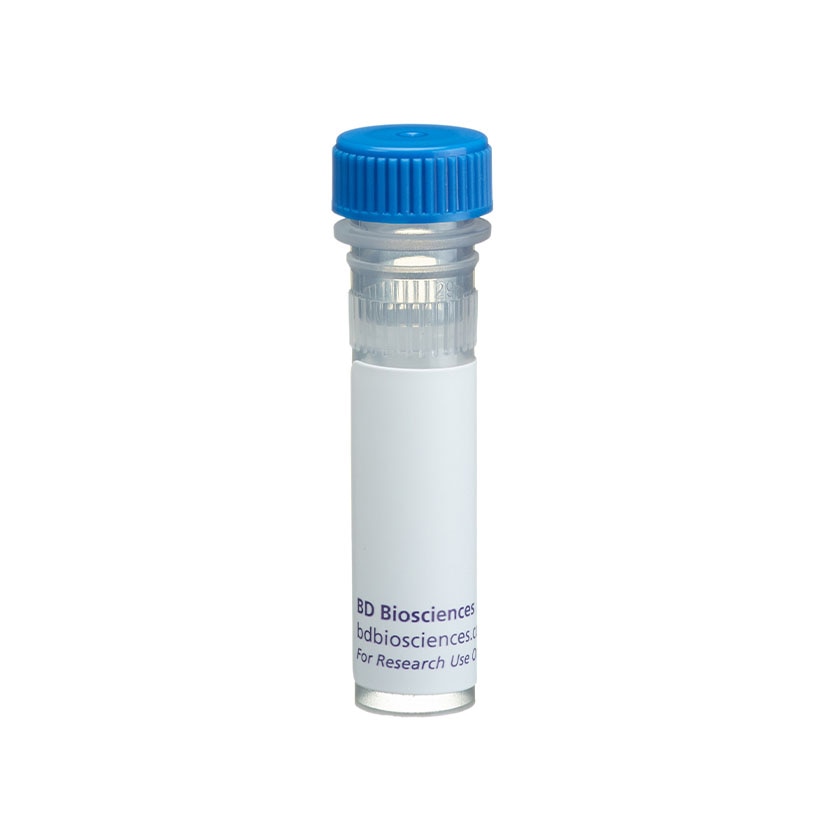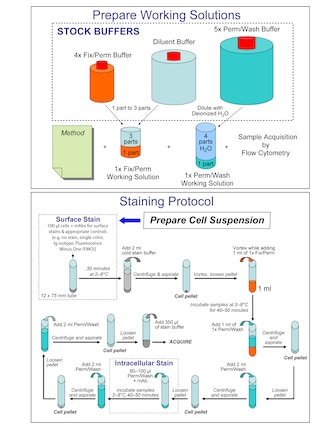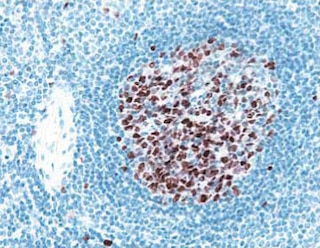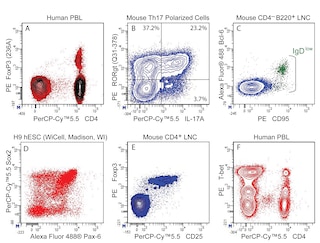Old Browser
This page has been recently translated and is available in French now.
Looks like you're visiting us from {countryName}.
Would you like to stay on the current country site or be switched to your country?




Analyses of Blimp-1 Expression Panel 1. Western blot analysis of Blimp-1 expression in human myeloma cell lines. Lysates from RPMI-8226 (ATCC CLL-155; Lane 1) and U266 (ATCC TIB-196; Lane 2) cells were electrophoresed, blotted and probed with Purified Rat Anti-Blimp-1 antibody (Cat. No. 564703) followed by HRP Goat Anti-Rat Ig (Cat. No. 554017), and ECL detection reagents. The antibody detects Blimp-1 isoforms of 88-92 kDa in both cell lysates and 76-78 kDa) in the U266 cell lysate. Note: an unspecific band (~250 kDa) may be observed upon overexposure of the membranes. Panel 2. Flow cytometric analysis of Blimp-1 expression in a human myeloma cell line. RPMI 8226 cells were fixed and permeabilized with the BD Pharmingen™ Transcription Factor Buffer Set (Cat No. 562574/562725) and stained with either Purified Rat IgG2a, κ (Cat. No. 553927; dashed line histogram) or Purified Rat Anti-Blimp-1 antibody (solid line histogram) followed by staining with PE Goat Anti-Rat Ig (Cat. No. 560767). The fluorescence histograms were derived from gated events with the forward and side light-scatter characteristics of intact cells. Flow cytometric analysis was performed using a BD FACSCanto™ II Flow Cytometer System. Panel 3. Immunohistochemical staining of human Blimp-1 in human tonsils. Following antigen retrieval with BD Retrievagen A Buffer (Cat. No. 550524), the formalin-fixed paraffin-embedded tonsil sections were stained with either Purified Rat IgG2a κ Isotype Control (Left Image) or Purified Rat Anti-Human Blimp-1 antibody (Right Image). A three-step staining procedure that employs Biotin Goat Anti-Rat Immunoglobulin (Cat. No. 559286), Streptavidin-Horseradish Peroxidase (HRP) (Cat. No.550946), and the DAB Substrate Kit (Cat. No. 550880) was used to develop the primary staining reagents. As shown in the Right Image, the Blimp-1 specific antibody primarily stained the nuclei of some Germinal Center cells. Original magnification: 40×.


BD Pharmingen™ Purified Rat Anti-Blimp-1

Regulatory Status Legend
Any use of products other than the permitted use without the express written authorization of Becton, Dickinson and Company is strictly prohibited.
Preparation And Storage
Recommended Assay Procedures
Note: Staining with PE Rat Anti-Blimp-1 antibody (Cat. No. 564702) is recommended for the flow cytometric analysis of Blimp-1 expression in human peripheral blood plasma cells.
Product Notices
- Since applications vary, each investigator should titrate the reagent to obtain optimal results.
- Please refer to www.bdbiosciences.com/us/s/resources for technical protocols.
- Sodium azide is a reversible inhibitor of oxidative metabolism; therefore, antibody preparations containing this preservative agent must not be used in cell cultures nor injected into animals. Sodium azide may be removed by washing stained cells or plate-bound antibody or dialyzing soluble antibody in sodium azide-free buffer. Since endotoxin may also affect the results of functional studies, we recommend the NA/LE (No Azide/Low Endotoxin) antibody format, if available, for in vitro and in vivo use.
- Caution: Sodium azide yields highly toxic hydrazoic acid under acidic conditions. Dilute azide compounds in running water before discarding to avoid accumulation of potentially explosive deposits in plumbing.
- Species cross-reactivity detected in product development may not have been confirmed on every format and/or application.
Companion Products






The 6D3 monoclonal antibody specifically binds to mouse B lymphocyte-induced maturation protein 1 (Blimp-1) and crossreacts with human BLIMP-1. Blimp-1 is a 98 kDa zinc finger-containing protein that is encoded by the Prdm1 gene. Blimp-1 was first discovered as a transcriptional repressor of the IFN-β promoter. Blimp-1 is critical for primordial germ cells specification in the early embryo and induction of terminal cell differentiation in multiple somatic cell types. It is largely known as a master regulator of antibody-secreting plasma cells due to its function in the repression of PAX5, CIITA and cMYC genes. Blimp-1 also controls T cell homeostasis and effector differentiation through different mechanisms, including repression of IL-17 producing cells. Blimp-1 also plays roles in the maturation and activity of dendritic cells and natural killer cells.
Development References (16)
-
Chan YH, Chiang MF, Tsai YC, et al. Absence of the transcriptional repressor Blimp-1 in hematopoietic lineages reveals its role in dendritic cell homeostatic development and function. J Immunol. 2009; 183(11):7039-7046. (Biology). View Reference
-
Crotty S, Johnston RJ, Schoenberger SP. Effectors and memories: Bcl-6 and Blimp-1 in T and B lymphocyte differentiation. Nat Immunol. 2010; 11(2):114-120. (Biology). View Reference
-
Huang S. Blimp-1 is the murine homolog of the human transcriptional repressor PRDI-BF1. Cell. 1994; 78(1):9. (Biology). View Reference
-
Johnston RJ, Poholek AC, DiToro D, et al. Bcl6 and Blimp-1 are reciprocal and antagonistic regulators of T follicular helper cell differentiation.. Science. 2009; 325(5943):1006-10. (Biology). View Reference
-
Jourdan M, Caraux A, De Vos J, et al. An in vitro model of differentiation of memory B cells intoplasmablasts and plasma cells including detailed phenotypic and molecularcharacterizatio. Blood. 2009; 114(25):5173-5181. (Methodology: Cell differentiation). View Reference
-
Kallies A, Carotta S, Huntington ND, et al. A role for Blimp1 in the transcriptional network controlling natural killer cell maturation. Blood. 2011; 117(6):1869-1879. (Biology). View Reference
-
Kallies A, Hasbold J, Tarlinton DM, et al. Plasma cell ontogeny defined by quantitative changes in blimp-1 expression. J Exp Med. 2004; 200(8):967-977. (Immunogen: Western blot). View Reference
-
Kallies A, Hawkins ED, Belz GT, et al. Transcriptional repressor Blimp-1 is essential for T cell homeostasis and self-tolerance. Nat Immunol. 2006; 7(5):466-474. (Biology). View Reference
-
Keller AD, Maniatis T. Identification and characterization of a novel repressor of beta-interferon gene expression. Genes Dev. 1991; 5(5):868-879. (Biology). View Reference
-
Kim SJ, Gregersen PK, Diamond B. Regulation of dendritic cell activation by microRNA let-7c and BLIMP1. J Clin Invest. 2013; 123(2):823-833. (Biology). View Reference
-
Martins GA, Cimmino L, Liao J, Magnusdottir E, Calame K. Blimp-1 directly represses Il2 and the Il2 activator Fos, attenuating T cell proliferation and survival. J Exp Med. 2008; 205(9):1959-1965. (Biology). View Reference
-
Ohinata Y, Payer B, O'Carroll D, et al. Blimp1 is a critical determinant of the germ cell lineage in mice. Nature. 2005; 436(7048):207-213. (Biology). View Reference
-
Salehi S, Bankoti R, Benevides L, et al. B lymphocyte-induced maturation protein-1 contributes to intestinal mucosa homeostasis by limiting the number of IL-17-producing CD4+ T cells. J Immunol. 2012; 189(12):5682-5693. (Biology). View Reference
-
Shaffer AL, Lin KI, Kuo TC, et al. Blimp-1 orchestrates plasma cell differentiation by extinguishing the mature B cell gene expression program. Immunity. 2002; 17(1):51-62. (Biology). View Reference
-
Smith MA, Maurin M, Cho HI, et al. PRDM1/Blimp-1 controls effector cytokine production in human NK cells.. J Immunol. 2010; 185(10):6058-67. (Biology). View Reference
-
Turner CA Jr, Mack DH, Davis MM. Blimp-1, a novel zinc finger-containing protein that can drive the maturation of B lymphocytes into immunoglobulin-secreting cells. Cell. 1994; 77(2):297-306. (Biology). View Reference
Please refer to Support Documents for Quality Certificates
Global - Refer to manufacturer's instructions for use and related User Manuals and Technical data sheets before using this products as described
Comparisons, where applicable, are made against older BD Technology, manual methods or are general performance claims. Comparisons are not made against non-BD technologies, unless otherwise noted.
For Research Use Only. Not for use in diagnostic or therapeutic procedures.
Report a Site Issue
This form is intended to help us improve our website experience. For other support, please visit our Contact Us page.